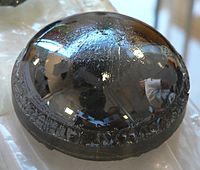
Photo from wikipedia
Abstract Despite major advancement in coating graphene layers at material surfaces, challenges still exist towards achieving rapid heating and cooling under low energy consumption. Herein, atmospheric pressure chemical vapor deposition… Click to show full abstract
Abstract Despite major advancement in coating graphene layers at material surfaces, challenges still exist towards achieving rapid heating and cooling under low energy consumption. Herein, atmospheric pressure chemical vapor deposition (APCVD) method was adopted to coat carbide-bonded graphene at the surface of zirconia substrate with a 2.7 cm diameter and a 1 cm thickness. The graphene coated zirconia substrate can achieve rapid thermal cycling with as high as approximately 50 °C/s of average heating rate at 150–320 °C temperature range using a low input voltage (12 V) and power (48 W). That is mainly due to the formation of highly qualified graphene and single-wall carbon nanotubes at the carburization layer, which is confirmed by the Raman spectra. The excellent electrothermal response characteristics is expectantly useful for rapid thermal cycling in injection molding thin-wall parts with high processing temperature (higher than 250 °C) under operation safety and low energy consumption, which is obviously absent in this emerging research area.
Journal Title: Ceramics International
Year Published: 2019
Link to full text (if available)
Share on Social Media: Sign Up to like & get
recommendations!